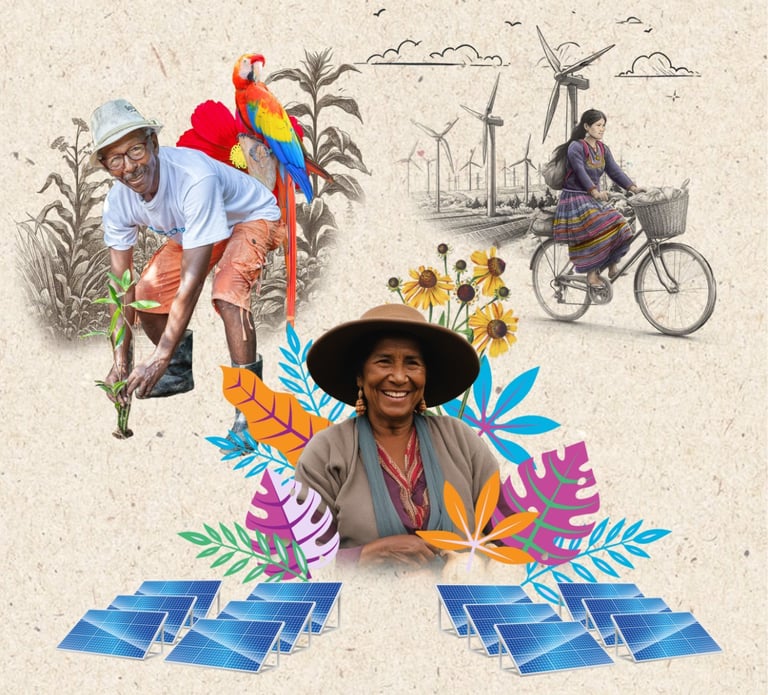Towards Energy Democratization in Colombia: Critical Reflections on the Energy Communities Decree and Upcoming Steps


We are excited to announce a significant milestone in Colombia's Just Energy Transition: the issuance of Decree 2236 of 2023 by the Ministry of Mines and Energy (MME). This marks the first step toward the establishment and operation of formally recognized Energy Communities, with the potential to access a range of benefits. While we celebrate this progress, it is important to recognize that it merely marks the beginning of a longer process. Several additional actions by various authorities will be required to ensure the effective, fair, and scalable implementation of this framework across the country.
We are particularly pleased to highlight the inclusion of important objectives in the Decree (Article 2.2.9.1.2). These include the effective democratization, decarbonization, decentralization, and the efficient, socio-environmentally responsible use of renewable energy resources. By prioritizing substance over form, these objectives set a clear foundation for what constitutes genuine Energy Communities. Beyond their legal definition, they must actively pursue these goals in the public interest. This paves the way for a transformative shift in how electric energy is generated and used in Colombia.
When it comes to pending actions, it is essential to recognize that the active, coordinated, and ongoing participation of all relevant authorities is critical to ensuring the successful consolidation and implementation of the Decree. In light of this, we present the following comments and recommendations on the issues that, after the issuance of the Decree, should be regulated and subsequently applied:
Defining the criteria for targeting public resources is a crucial step. The MME must establish them transparently and avoiding ambiguities, prioritizing vulnerable communities in an effective rather than just a formal sense. To achieve this, it should begin by adopting accurate and updated vulnerability parameters and tailoring them to the specific realities of both urban and rural contexts. The lack of a clear deadline for defining these criteria creates uncertainty, and we strongly urge the MME to address this issue without delay.
The importance of a precise definition of "renewable fuels" cannot be overstated. The MME must provide a definition that is consistent with the objectives outlined in higher laws (on environmental protection, non-conventional renewable energy sources, and climate change) as well as the Decree itself, particularly the decarbonization goal, to prevent interpretations that might undermine these objectives.
The regulation of the Energy Communities Registry is another critical step that remains pending. It is essential for the MME to clarify whether this will coexist with a potential additional registration with the Superintendence of Public Household Utilities (Superintendencia de Servicios Públicos Domiciliarios - SSPD). Administrative simplification and consistency are key to ensuring the success of the Energy Communities.
Equally important is the definition of requirements for priority connection to the Local Distribution System. The Energy and Gas Regulatory Commission (CREG) faces the challenge of establishing criteria that are both ambitious and realistic, ensuring that Network Operators (Operadores de Red - OR) assume a genuine obligation (of means, not results) to uphold the priority established by the Decree for infrastructure associated with Energy Communities (including microgrids).
It is crucial to create conditions that foster genuine decentralization and democratization of energy-related activities, while avoiding practices such as “remote self-generation” where companies may attempt to co-opt a model that was not intended for them. Reaffirming the primacy of substance over form, it is vital that, within its respective competencies, the MME, CREG, and UPME take proactive measures to ensure that the true objectives of the Energy Communities are not diluted, and that the scheme is not misused to conceal profit-driven business models by companies and agents.
The determination of the conditions for transferring infrastructure to the communities is equally crucial. While the Decree does not set a specific deadline for this determination, the MME should aim to complete it within the first half of 2024, alongside other related activities.
The definition of criteria for subsidies aimed at lower tariffs is urgent, particularly when the financing of the corresponding energy solution involves both public and private resources. This definition must prioritize the protection of beneficiary users, ensuring that their conditions are not worsened.
In light of the above, we call for prompt action and continued collaboration, beginning with the various government authorities responsible for issuing the administrative acts required to fulfill the mandates set out in the Decree. The success of Energy Communities in our country, as a key element of the Just Energy Transition, will depend on the dedication and consistency with which the design of the remaining regulations is approached.
At #POLENTJ, as part of civil society, we are committed to supporting this process and contributing within our capacity, while being always mindful that justice must be a central element in the strategies driving the energy transition.



